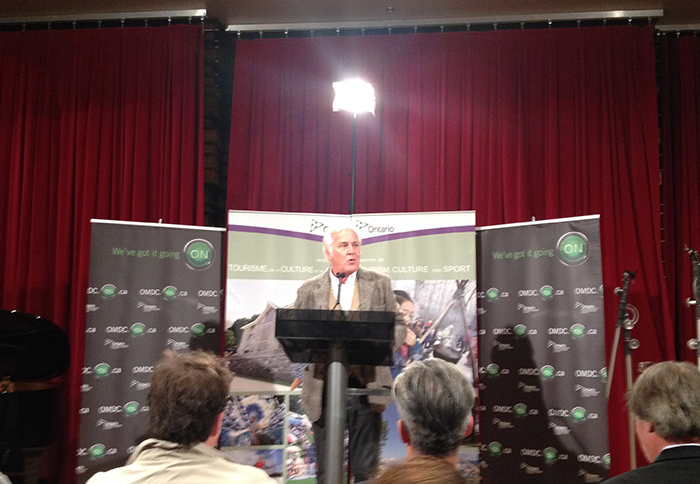 The Rambler is a column by Graham Henderson, President of Music Canada. Graham writes from time to time about developments in the music industry, new trends or just about music! Let’s face it, Graham has been around for a long time and has a lot to ramble on about.
The Rambler is a column by Graham Henderson, President of Music Canada. Graham writes from time to time about developments in the music industry, new trends or just about music! Let’s face it, Graham has been around for a long time and has a lot to ramble on about.
Music tourism is big business and represents a major opportunity for Toronto and Ontario. This is one of the primary conclusions from Music Canada’s study on accelerating the music industry in Toronto that we released in June this year. And people are taking notice.
In 2011, Music Canada commissioned two landmark studies. The first was designed to estimate the economic impact of the recorded music and live performance sectors in Canada. Music Canada retained the services of PwC to perform the former study and the Titan Music group to perform the latter.
The impact study was released publicly at our Annual General Meeting on June 13th in Toronto. Then, the following day, at NXNE, we released Accelerating Toronto’s Music Industry Growth, Leveraging Best Practices from Austin, Texas. The two studies were designed to work together and to afford for the first time an understanding of the importance of recorded music and live performance to the economy of Ontario and, in particular, Toronto.
This is familiar history by now. What may not be known is the extent to which these studies have gained traction in the music community and at all levels of government. While the role our community plays in weaving the cultural fabric of our country is well understood in the general population and is understood by the federal government and to some extent at the provincial level, the importance of music as an economic driver in Canada was virtually unknown. Assistance was provided to the music community, not because it was thought to be an important economic actor, but because it was “the right thing to do”, because it was thought possible in this way to safeguard a distinctive Canadian culture. No government ever thought to assist the music community in the way, say, the film and the video game sectors are supported – because it is a large, vibrant, desirable economic actor. It’s the difference between looking at music as “art” or as “commerce” – a key difference noted in our second study between Toronto and Austin. In Toronto, and indeed in Ontario and Canada, the tendency is to look at music as “art”.
Well, the PwC study established beyond a doubt that music was about high quality jobs, largely focused in the younger demographic. It proved beyond a doubt that music had an economic impact and not just a cultural one. This is an impact that, by the way, extends far beyond our borders. I would argue that Canada, Ontario and Toronto have failed utterly (to their collective detriment) to recognize the importance of music to the cultural and economic cocktail that makes up “brand Canada”. The cultural and economic one-two punch of music makes it more than a lightweight, more than a middleweight, it makes music a HEAVYWEIGHT. Understanding this has helped us to bring music in from the “policy maker’s cold”; it has helped us to gain respect for our community; it has put us on the map.
And speaking of maps, one of the more stunning conclusions of the PwC study was that the majority of economic activity in the music sector is concentrated in Ontario and particularly the GTA: over 80% of it. For a province and a city desperate to differentiate themselves from other regions, a healthy and in the case of live performance, booming, music sector represents a godsend. Aside from the sort of intangible benefits that a thriving music sector can lend to a city (as so amply demonstrated in the writing of Richard Florida), aside from the jobs it can provide to enthusiastic young people, there is yet another aspect which has gone completely unnoticed and undervalued: music tourism.
The reason we commissioned our unprecedented “tale of two cities”, comparing the music scenes in Toronto and Austin, was to demonstrate exactly how valuable an asset music can be to a local economy. The Austin study demonstrated in a graphic manner what a community like Austin can do when it harnesses the economic potential of music: it is worth hundreds of millions to the economy, possibly billions.
Beginning in the late 1980s, and founded largely on two principal assets, Austin City Limits and the SXSW music festival, Austin developed a plan and worked what amounts to an economic miracle. The economic impact on the economy was astonishing, first measured at around 600 million dollars, it rapidly almost TRIPLED. Austin began marketing itself as the Live Music Capital of the World and ensured that visitors don’t go home without experiencing live music.
The result? Nearly half of all economic activity generated by the commercial music sector in Austin is music tourism – about $800 million in 2010. Austin’s two largest music events, South by Southwest Film, Interactive and Music Conference, and Austin City Limits Festival, each grew by $25 million per year from 2005 to 2010. A whopping 20% of the economic activity generated in ALL tourism in Austin is attributed to music tourism.
Now, imagine what Toronto and Ontario could do….if they only understood the nature of the asset and had a plan. As the study’s authors pointed out, Toronto starts from a place far ahead of where Austin is even now. Toronto has the 4th largest number of live music establishments per capita in North America; we have world class recording studios; we produce international stars who have received their start in the Toronto music scene, creating a bevy of musical “landmarks” for the avid fan; Toronto is home to the head offices of all three major labels and 16 of the largest domestic independent labels. Any night of the week you can find music of every genre, from every Diaspora of the world – performed at famous, brilliantly equipped venues such as the Horseshoe Tavern and the Molson Amphitheatre. Toronto is, without a doubt, the music capital of Canada and one of the great music centres of the world.
People already travel to Toronto to see concerts, festivals and to experience the myriad of diverse live music events the city offers. This organic activity has created a strong foundation. It’s time to crank it up a notch or two.
It’s time to INVITE people to our city to experience live music.
This idea has galvanized two levels of government. At the City of Toronto, the Economic Development Committee, with strong leadership from Councillors Thompson, Colle and Carroll, received the Austin study with enthusiasm, sending it to staff with a demand that they bring forward recommendations. Support has been voiced across the political spectrum at council and right to the Mayor’s office. At the Provincial level, the Minister of Tourism, Culture and Sport, The Honourable Michael Chan, who seems to be remaking himself as the “music minister”, similarly sought ideas from his staff about how to harness the power of music tourism. My impression is that at both levels of government, the uptake is moving at near light speed. Both City and Province are behaving in an exemplary, entrepreneurial and business-like manner.
One very concrete example of our progress can be found here. For the first time Ontario Tourism has undertaken a specific focus on music. Their fall travel guide highlights live music events in Ontario – music festivals, concerts and clubs get profiled beside some of the more traditional features like fall driving trips and wine and culinary experiences. Though surprisingly slower on the uptake, Toronto Tourism seems to be recognizing the potential as well. In a recent interview on Here and Now, Andrew Weir of Tourism Toronto mentioned the music scene as a key attraction for overseas visitors.
Toronto and Ontario have one of the most active and most diverse live music markets in the world. It’s time we started telling someone. The new, global digital environment has changed the rules of the game for all of us. In the music industry, we need a new industrial strategy. Music tourism represents an enormous opportunity to stimulate the live music sector, generating more activity, gigs and dollars, and thereby creating a healthier, more vibrant music industry for all. Our country’s musicians are under unprecedented pressure, it is increasingly difficult for them to make a living as professional musicians. One way we can help is to attract tourists to Ontario and Toronto….it could be the difference between two paying gigs and one, or one instead of none. The treasure is here. Let’s bring the world to Ontario to find it. We are home to one of the great musical wonders of the world.
Graham Henderson is the President of Music Canada. He also writes on an eclectic range of topics on his personal blog at www.grahamhenderson.ca.



 The Rambler is a column by Graham Henderson, President of Music Canada. Graham writes from time to time about developments in the music industry, new trends or just about music! Let’s face it, Graham has been around for a long time and has a lot to ramble on about.
The Rambler is a column by Graham Henderson, President of Music Canada. Graham writes from time to time about developments in the music industry, new trends or just about music! Let’s face it, Graham has been around for a long time and has a lot to ramble on about.
Music Canada